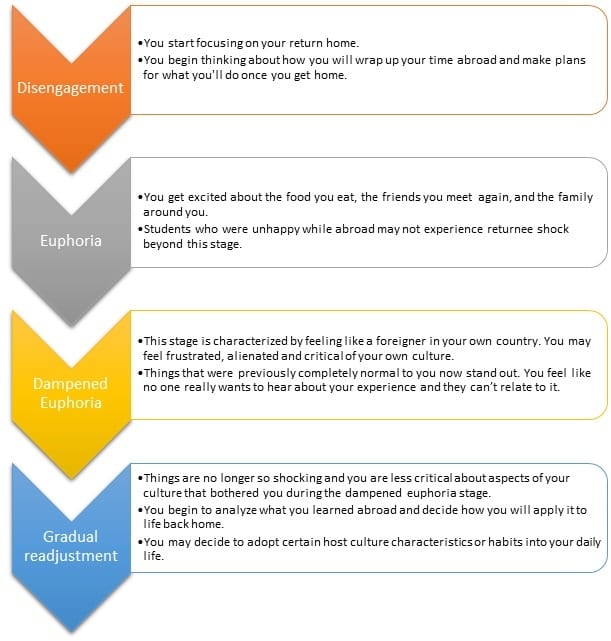Reverse culture shock stages
Dawn Kepets wrote a book, “Back in the USA: Reflecting on Your Study Abroad Experience and Putting It to Good Work”, analysing the stages of reverse culture shock. The stages are summarised below. You might find it helpful to see which particular stage you are at.
As humans, we like certainty. We prefer linear processes rather than chaos. But when you deal with something like reverse culture shock, there are times when things simply don’t proceed in such a linear manner. The stages described by Kepets are no doubt representative of what many may experience.
For many, moving on from their time abroad is easy. Much easier than moving abroad. But there are others who adapted well to their host nation, and suddenly found their host nation looking more like their home nation.
For those, this is when reverse culture shock starts evolving into a complex form of grief.
Reverse culture shock has many similarities to grief and loss. The loss of a cherished experience, the identity you built up for yourself abroad, the friends you had… any single one of these losses can hurt badly. But returning home is complicated by the fact that all these losses are simultaneous and very fast. One morning you’re there, and the next… you’re gone.

I’ve personally found the stages of grief described by Kübler-Ross more helpful in identifying where I am at. However, instead of looking at it as a linear process, see it more like a description of the stages you might oscillate through as you attempt to adjust back to life back home.
In the beginning, denial might manifest itself as you refuse to accept the fact that you are back home. For me, I stayed out of home as much as possible, not wanting to confront the fact that I was back home, living with my parents again. For others, denial might look like constant reminiscence about your times abroad, looking through your photos, emails, and memories of your time there.
Anger begins as you start questioning why you returned home. It can be frustrating as you compare your current experiences to what happened previously. You find that home never seems to measure up. As the saying goes, ‘The grass is always greener on the other side.’
‘If only I had stayed! If only I had found a job abroad! If only…’ Bargaining gives you a sense of control as your imagination starts around what you could have done to change the situation. However, you and I know the truth. You’re back now. And in this present moment, this is no longer your host country.
As you slowly stop running away and start facing reality, you start getting in touch with your emotions. Depression sets in. The sadness and heaviness surrounding your losses fill you. I sobbed when I finally realised that England was no more. You might too. It’s okay.
Accepting what has gone and embracing what might come is a place that all of us would hopefully come to. For me, that is still a stage I’ve yet to reach. For others, what helped? You might wish to comment below.
Or if it’s personal, please feel free to wish out at www.savethesocialworker.com
This is the third of a 5-part series on dealing with culture shock.
Part 1: Why does culture shock and reverse culture shock happen?
Part 2: Dealing with culture shock
Part 4: What is reverse culture shock?
Part 5: Overcoming reverse culture shock
Keen on a career in social work? Read this!
Last Updated on 15 June 2023

John is a registered social worker who has worked with hundreds of parents at a Family Service Centre, and is the author behind Take Heart, which helps young people better deal with their emotions.






